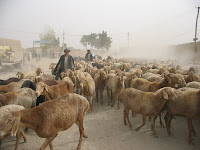A few examples:
We re-visited the small villages of Chandipur and Shahid Matangini in West Bengal, home of the Patachitra painters. The Patachitras make their living by selling their artwork which they present to the public accompanied by singing. They have practiced this art for hundreds of years. A group of 20 Patachitras participated in our workshops last Spring aimed at expanding their performing abilities and thus improving the saleability of their artwork which has been diminishing over the years. We created two new shows with the Patachitras. Now, six months later, we visited them to see if the new techniques they learned are being used.
 We were very happy to find that the villagers were so taken with the new presentation techniques and ideas we gave them that they have now created a new performance piece based on current village events that has gained them much-needed attention and has measurably added to each of the participant's income.
We were very happy to find that the villagers were so taken with the new presentation techniques and ideas we gave them that they have now created a new performance piece based on current village events that has gained them much-needed attention and has measurably added to each of the participant's income.The Patachitra's new piece takes place under a painted canopy, inspired by our workshop. We encouraged participants to paint other items besides their traditional scroll form.

The performing group consisted of three members from our workshop program and four other villagers whom they taught. This is highly unusual since the Patachitras never work as a group, only as individual painters. About their new spirit of cooperation, Bablu, who organized the ensemble, said, "I told the others, if these people could come together from the United States and Afghanistan to work with us, we should be able to meet between our villages!"
 We also found that our past work at Gandhi Smriti in Delhi has opened new doors to our team member and collaborator, Subhash Rawat. As a direct result of the initiative in February at Gandhi Smriti teaching their vocational students, 30 young people, ten from our original workshops, got together under Subhash's direction to make a play about Gandhi's childhood "Moniya - the child that Mahatma was." We were in town for the premiere and it was a huge success! Many of the children in the play had never acted before, or had their first experience in our workshops last Spring. Now Gandhi Smriti plans to tour the new play throughout India. Congrats Subhash!
We also found that our past work at Gandhi Smriti in Delhi has opened new doors to our team member and collaborator, Subhash Rawat. As a direct result of the initiative in February at Gandhi Smriti teaching their vocational students, 30 young people, ten from our original workshops, got together under Subhash's direction to make a play about Gandhi's childhood "Moniya - the child that Mahatma was." We were in town for the premiere and it was a huge success! Many of the children in the play had never acted before, or had their first experience in our workshops last Spring. Now Gandhi Smriti plans to tour the new play throughout India. Congrats Subhash!









 The workshops have started well and we are more than busy: the theatre group in the morning, the ‘magic box’ children in the afternoon, and a class for older male students some evenings, as well as performances of “A Tale of Two Kites” at local schools and orphanages.
The workshops have started well and we are more than busy: the theatre group in the morning, the ‘magic box’ children in the afternoon, and a class for older male students some evenings, as well as performances of “A Tale of Two Kites” at local schools and orphanages.






























